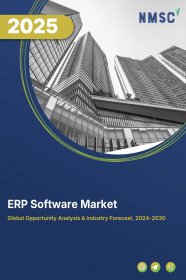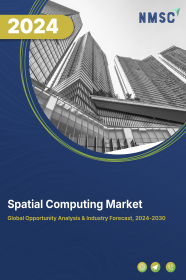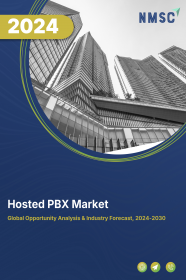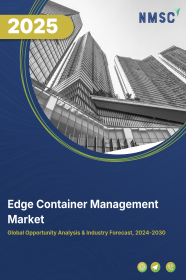
ERP Software Market by Component (Software and Service), by Deployment (On-premise, Cloud, and Hybrid), by Business Function (Finance, Human Resource (HR), Supply Chain, Customer Management, inventory Management, Manufacturing Module, and Others), by Industry Vertical (Manufacturing, BFSI, Healthcare, Retail & Distribution, and Others), by End User (Small and Medium Sized Enterprise, and Large Enterprise) - Global Opportunity Analysis and Industry Forecast, 2020 – 2030
Industry: ICT & Media | Publish Date: 28-Jan-2025 | No of Pages: 529 | No. of Tables: 371 | No. of Figures: 316 | Format: PDF | Report Code : IC327
Market Definition
The global ERP Software Market size was valued at USD 37.53 billion in 2019 and is predicted to reach USD 68.34 billion by 2030 with a CAGR of 5.6% from 2020-2030.
Enterprise Resource Planning (ERP) software integrates and automates the entire business ecosystem, by providing quality business management, enhanced traceability, increased production capacity, and greater tax support.
ERP software proficiently handles Human Resource (HR) management, inventory management, customer management, product planning, manufacturing, sales, and marketing. ERP software assists in monitoring the entire supply chain from a single user interface, with reduced errors and higher operational efficiency.
Market Dynamics and Trends:
The global market is proliferating due to growing demand from manufacturing industry, small & medium scale enterprises, and corporate sector. Moreover, increasing demand for Human Resource module, is projected to create ample opportunities for the ERP software market growth.
Furthermore, factors such as increasing penetration of AI, API, IoT, automation, and robotics technologies, growing preferences to digitize entire business ecosystem, and upsurge in cloud computing, are anticipated to supplement the growth of market in coming future.
However, availability of open source applications and high maintenance cost are expected to negatively impact the growth of market. Moreover, emergence of large enterprises and proliferating BFSI sector raises the demand for efficient ERP solutions, thereby propelling the growth of ERP software market throughout the forecast period.
Market Segmentations and Scope of the Study
The global ERP software market report has been analyzed based on component, deployment, business function, industry vertical, end user and geography. Based on component type, the market is divided into software and service based. Based on deployment, the market is fragmented into cloud, hybrid, and on-premise. Based on business function, the market is segmented into finance, Human Resource (HR), supply chain, customer management, inventory management, manufacturing module, and others.
Based on industry vertical, the global market is bifurcated into manufacturing, retail & distribution, BFSI, healthcare, government & utilities, IT & telecom, aerospace & defense, construction, and others. Based on end user, the market is divided into large enterprises, medium enterprises, and small enterprises. Geographic breakdown and analysis of each of the previously mentioned segments include regions comprising North America, Europe, Asia-Pacific, and RoW.
Geographical Analysis
North America dominated the global ERP software market in the past and is expected to maintain this trend throughout the forecast period, owing to presence of ERP software traders in large numbers. Moreover, factors such as higher adoption of cloud computing for business orientation, higher economic standards, and increased penetration of new markets, are projected to propel the growth of the market throughout the forecast period.
Asia Pacific is expected to witness a substantial market growth accounting for the highest CAGR values in the global ERP software market, throughout the forecast period. This is attributed to presence of emerging economies especially India and China, evolution of small business enterprises, and growing awareness regarding the benefits offered by ERP software in managing the overall business ecosystem.
Competitive Landscape
The ERP software industry is highly competitive and consists of various market players. Some of the major market players include Pronto Software Limited, Epicor Software Corporation, Acumatica, Microsoft Corporation, SAP SE, Oracle NetSuite, Salesforce, Inc., Xero Limited, Sage Group, MYOB Technology Pty Ltd, Odoo, Workday, SYSPRO, ECI Software Solutions, QAD Inc., among others. The key players are employing strategies such as product launches, technical collaboration, and acquisition in-order to gain stronger position in the market.
For instance, in September 2019, Oracle Corporation, one of the major players in the global market, announced the availability of Oracle Analytics, a Fusion ERP product. This is the first-ever application umbrella service, delivered under Oracle Analytics Cloud, that consolidates more than 18 Oracle BI and analytics products under a single brand value.
In April 2020, SYSPRO, the pioneer in industrial-built ERP software, announced its latest ERP product with enhanced features, that enables the manufacturers and distributors to securely integrate and automate the entire business ecosystem.
In June 2020, Infor, a leading business cloud software specialized industry in the ERP software market, announced that De Menken Keuken has chosen the Infor M3 ERP solution, to enhance its operational efficacy, assist in providing business continuity, and support its business growth. Along with this, Infor M3 ERP solution promises to enhance the quality management, increase tracing capabilities, and ensure quality business management of the entire manufacturing, warehousing, distribution, and supply chain.
Key Benefits
-
The ERP software market report provides the quantitative analysis of the current market and estimations through 2020-2030 that assists in identifying the prevailing market opportunities to capitalize on.
-
The study comprises a deep dive analysis of the ERP software market including the current and future trends for depicting the prevalent investment pockets in the market.
-
The report provides detailed information related to key drivers, restraints, opportunities, and their impact on the market.
-
The report incorporates competitive analysis of the market players along with their market share in the global market.
-
The SWOT analysis and Porters Five Forces model is elaborated in the study of the market.
-
Value chain analysis in the global market study provides a clear picture of the stakeholders’ roles.
ERP Software Market Key Segments
By Component
-
Software
-
Service
By Deployment
-
On-premise
-
Hybrid
-
Cloud
By Business Function
-
Finance
-
Human Resource (HR)
-
Supply Chain
-
Customer Management
-
Inventory Management
-
Manufacturing Module
-
Others Business Function
By Industry Vertical
-
Manufacturing
-
BFSI
-
Healthcare
-
Retail & Distribution
-
Government & Utilities
-
IT & Telecom
-
Construction
-
Aerospace and Defense
-
Other Industries
By End User
-
Small and Medium Sized Enterprise
-
Large Enterprise
By Geography
-
North America
-
The U.S.
-
Canada
-
Mexico
-
-
Europe
-
The UK
-
Germany
-
France
-
Italy
-
Spain
-
Denmark
-
Netherlands
-
Finland
-
Sweden
-
Norway
-
Russia
-
Rest of Europe
-
-
Asia-Pacific
-
China
-
Japan
-
India
-
South Korea
-
Australia
-
Indonesia
-
Singapore
-
Taiwan
-
Thailand
-
Rest of Asia-Pacific
-
-
RoW
-
Latin America
-
Middle East
-
Africa
-
Key Players:
-
Pronto Software Limited
-
Epicor Software Corporation
-
Acumatica
-
Microsoft Corporation
-
SAP SE
-
Oracle NetSuite
-
Salesforce, Inc.
-
Xero Limited
-
Sage Group
-
MYOB Technology Pty Ltd
-
Odoo
-
Workday
-
SYSPRO
-
ECI Software Solutions
-
QAD Inc.
Report Scope and Segmentation
|
Parameters |
Details |
|
Analysis Period |
2019–2030 |
|
Base Year Considered |
2020 |
|
Forecast Period |
2020–2030 |
|
Market Size Estimation |
Billion (USD) |
|
Market Segmentation |
By Component (Software, Service) By Deployment Model (On-premise, Cloud, Hybrid) By Business Function (Finance, Human Resource (HR), Supply Chain, Customer Management, Inventory Management, Manufacturing Module, Other Business Function) By End User (Large Enterprises, Medium Enterprises, Small Enterprises) By Industry Vertical (Manufacturing, BFSI, Healthcare, Retail & Distribution, Government & Utilities, IT & Telecom, Construction, Aerospace & Defense) |
|
Geographical Segmentation |
North America (U.S., Canada) Europe (UK, Germany, Italy, France, Spain, Rest of Europe), Asia-Pacific (China, Japan, India, Australia, South Korea, Rest of APAC), Rest of the World (Latin America, Middle East, Africa) |
|
Companies Profiled |
Oracle Corporation, SAP SE, Sage Software Solutions Pvt. Ltd., Infor, Workday, Inc., Epicor Software Corporation, Microsoft Corporation, SYSPRO, Deskera, and IFS. |

















 Speak to Our Analyst
Speak to Our Analyst




















